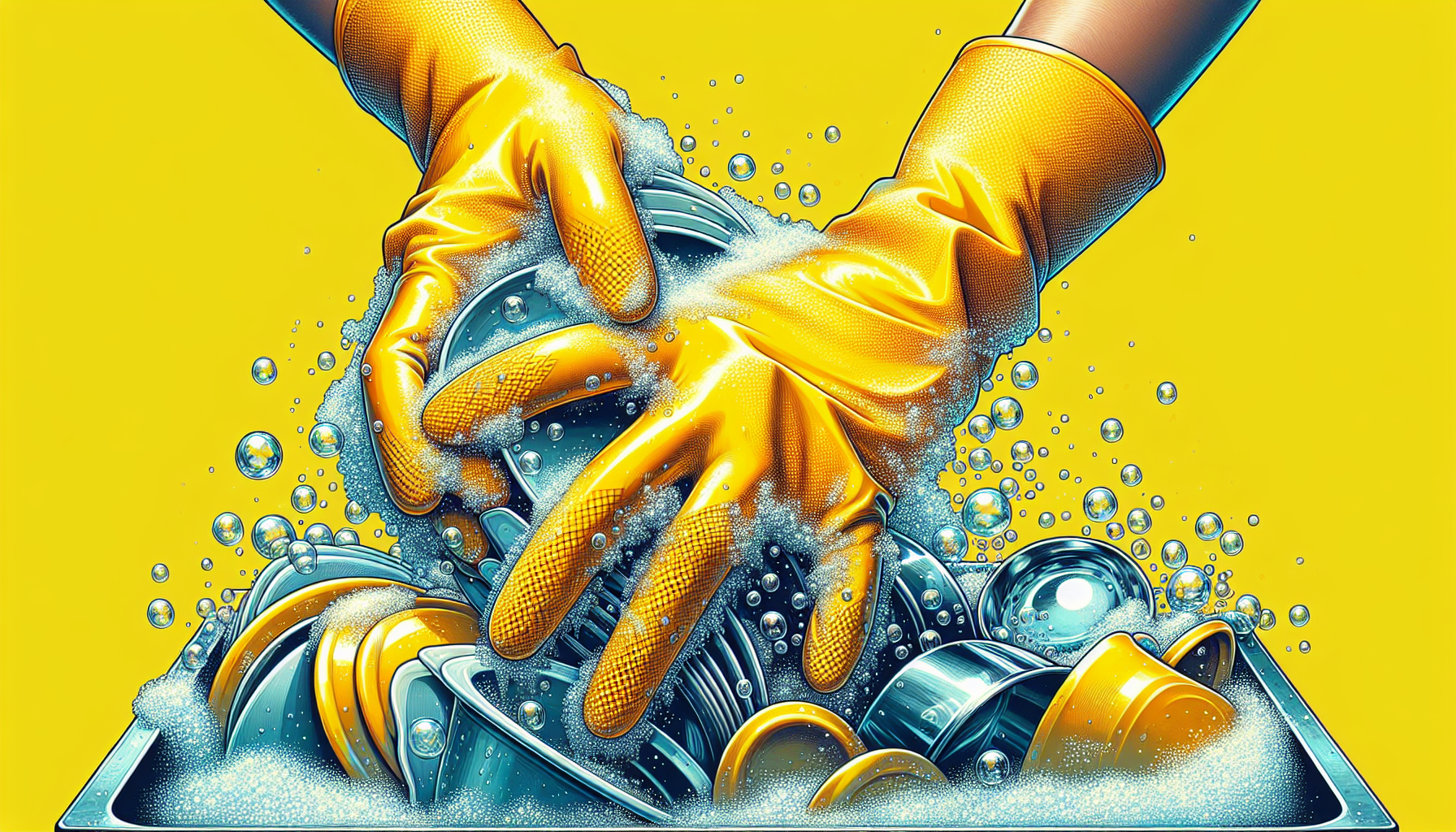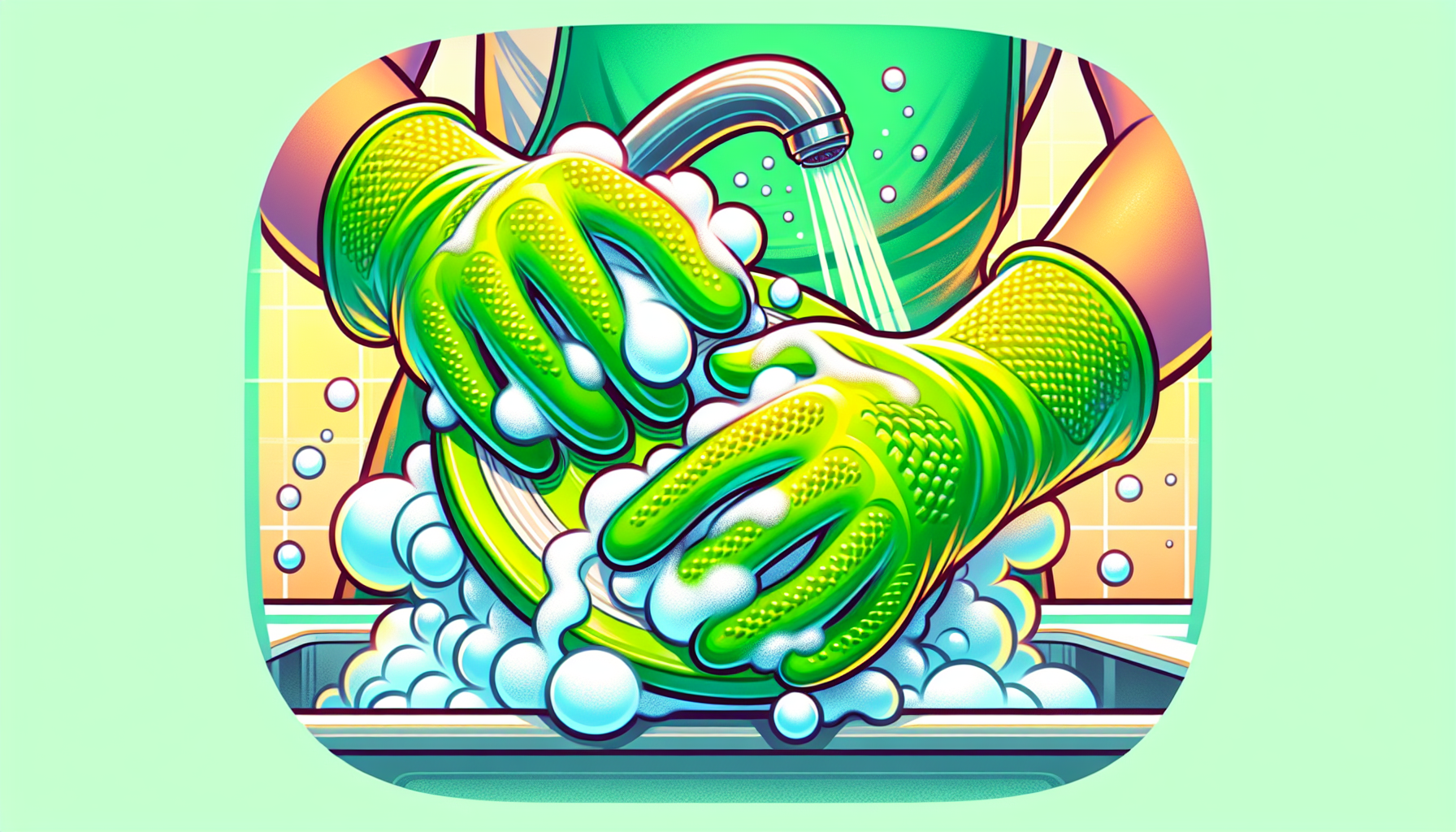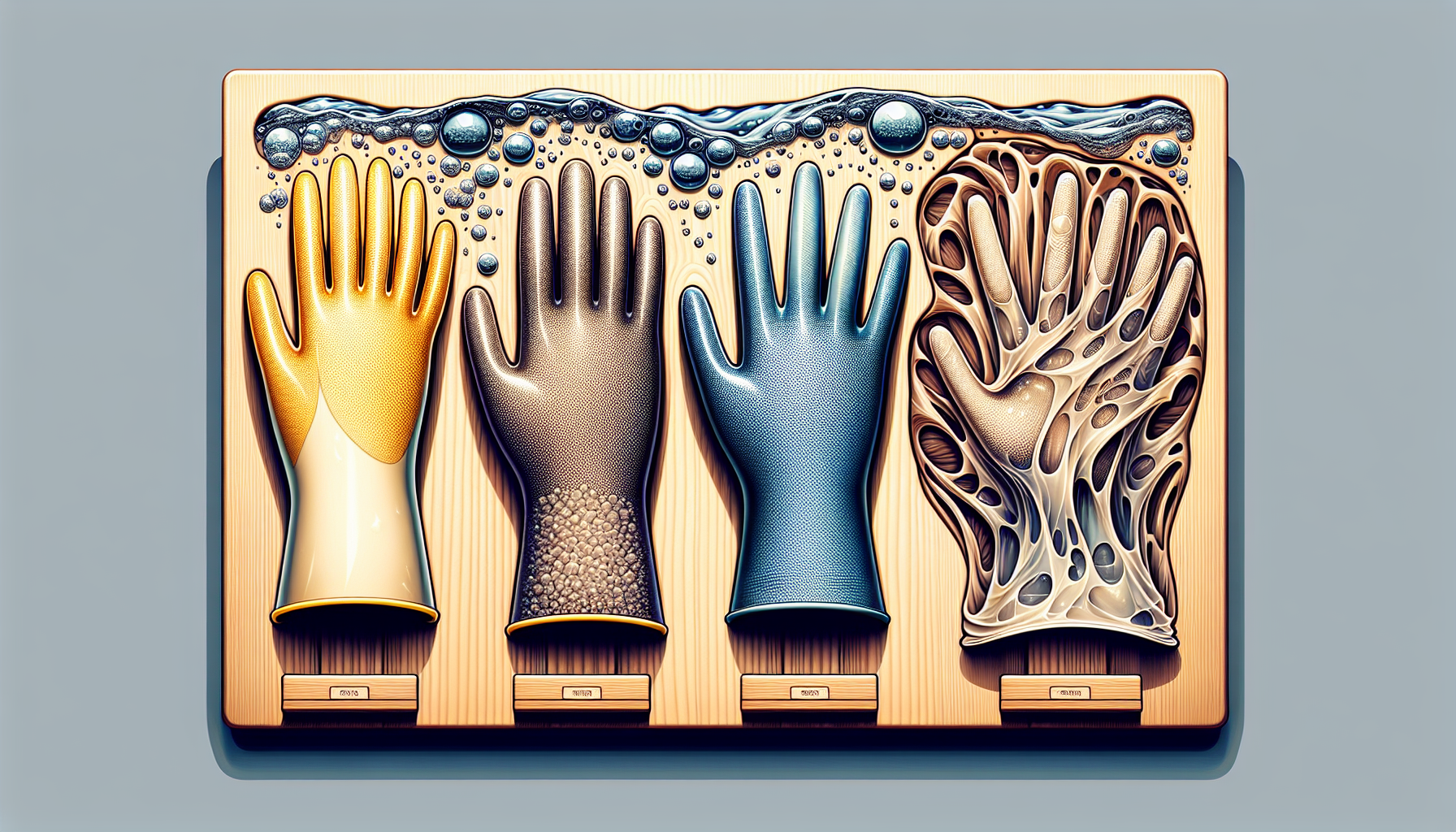Are rubber gloves good for washing dishes? The short answer is yes – they safeguard your skin from detergents, prevent cuts, and withstand hot water. If you’re wondering about their effectiveness and comfort, read on: we’ll explore the protection, efficiency, and sense of touch that rubber gloves provide during your dishwashing endeavors.
Key Takeaways
- Rubber gloves act as a protective barrier against hot water, chemicals, and sharp objects when washing dishes, reducing the risk of skin irritation and injuries.
- Dishwashing gloves improve cleaning efficiency by enhancing grip on slippery dishes and encouraging more thorough scrubbing without worrying about hot water or harsh soaps.
- Maintaining dishwashing gloves is key for longevity; proper cleaning, drying, and storage prevent bacterial growth and ensure the gloves remain in good condition for future use.
The Protective Benefits of Rubber Gloves for Dish Duty

Let’s start with the basics. Why wear gloves for washing dishes? Is it just a matter of comfort or is there more to it? To answer these questions, let’s explore the protective benefits that dishwashing gloves offer.
Picture yourself washing dishes. The hot water, the soap, the slippery dishes, and, not to forget, the sharp edges. It’s a potentially skin-damaging, injury-causing combination, isn’t it? This is where dishwashing gloves step in, offering a protective shield against these elements.
Rubber gloves, in particular, are excellent at this job. They provide a protective barrier against that harsh combination of hot water and soap, preventing potential skin damage during dishwashing tasks. Whether it’s skin irritation from harsh dishwashing soaps or minor cuts and abrasions from utensils and glassware, gloves have got you covered.
For restaurant workers and others involved in heavy-duty dishwashing, the best dishwashing gloves are a must for protecting against prolonged exposure to hot, soapy water and reducing the risk of wrinkles, dryness, and rough texture of the hands. To ensure maximum protection and durability, consider investing in a pair of heavy duty dishwashing gloves.
Shielding Skin from Harsh Chemicals
Dishwashing soaps are great for getting rid of those stubborn stains and grease on your dishes. But have you ever thought about what those cleaning agents could do to your skin? Dishwashing chemicals can be pretty harsh on the skin, stripping away its natural oils and leaving it dry and irritated. This is where the magic of dishwashing gloves comes into play.
Rubber gloves serve as a protective barrier between your skin and these harsh chemicals, preventing skin irritation. They help preserve the skin’s natural oils, protecting against the drying effects of dishwashing soap. This protective layer is especially beneficial for individuals with sensitive skin or existing cuts, helping to prevent further irritation and dryness.
So, the next time you’re up for a dishwashing task, remember, it’s not just a matter of cleanliness; it’s also about preventing cracked skin and taking care of your skin.
Safeguarding Against Heat and Sharp Objects
Washing dishes isn’t just about battling grease and grime; it’s also about dealing with heat and sharp objects. Can you remember trying to wash a dish with scalding hot water with bare hands? Or the time you accidentally cut your hand on a broken glass? These are the types of incidents that dishwashing gloves can help prevent.
Rubber gloves act as a barrier to protect your skin from scalding due to hot water. But that’s not all! They also shield your hands from cuts that could occur from handling or accidentally breaking dishes. Quality gloves provide protection against both cuts and subsequent infections, which can arise from contact with broken dishes and sharp objects. So, wearing gloves while washing dishes isn’t just a good idea; it’s a safety measure.
Enhancing Cleaning Efficiency with Dishwashing Gloves

Beyond safety and protection, there’s another compelling reason to don those dishwashing gloves - cleaning efficiency! Yes, whether you’re dealing with a mountain of greasy pans or a delicate wine glass, wearing gloves can up your dishwashing game.
Rubber gloves enhance the user’s grip on slippery dishes, which is critical in preventing breakage during washing. Imagine handling a slippery, soapy dish with bare hands - the chances of it slipping and breaking are pretty high, right? Now, imagine the same scenario, but this time you’re wearing gloves. The improved grip significantly reduces the risk of dropping dishes. High-quality dishwashing gloves maintain flexibility and dexterity even when soapy, enabling users to handle dishes and cleaning tools more effectively. So, it’s not just about keeping your hands dry and protected; it’s also about doing a better job of washing those dishes.
Improving Grip for Slippery Tasks
Let’s face it; dishwashing can sometimes feel like an extreme sport, especially when you’re dealing with slippery dishes. But don’t worry, the right pair of gloves can turn this challenging task into a walk in the park.
The texture of rubber gloves can help secure a better grip on wet dishes, reducing the risk of dropping them. Some dishwashing gloves even feature non-stick textures and lightly textured surfaces to ensure secure handling of slippery and delicate glassware. For instance, the Casabella Waterstop Premium Rubber Gloves are favored for their texture and flexibility, which enhance grip and dexterity.
Enhanced grip from rubber gloves reduces the likelihood of dropping and breaking dishes, while also providing a barrier against potential cuts from shattered items.
Encouraging More Thorough Washing
Now let’s talk about the actual cleaning process. You might think that gloves would impede the washing process, but it’s quite the opposite. Wearing gloves can actually encourage more thorough scrubbing and cleaning of dishes.
Protection from the combination of hot water and soap by wearing gloves can encourage more thorough scrubbing and cleaning of dishes. People might be more willing to hand wash dishes with hot water and scrub harder when their hands are protected by gloves.
So, the next time you’re faced with the household chore of a pile of dirty dishes, remember that wearing gloves, especially worn gloves, might just be the key to getting those dishes sparkling clean.
The Role of Rubber Gloves in Food Safety

From preventing skin damage to enhancing cleaning efficiency, we’ve seen how dishwashing gloves can make dishwashing a breeze. But did you know that these gloves also play a crucial role in maintaining food safety? Let’s explore this aspect further.
Wearing dishwashing gloves helps prevent cross-contamination between dishes and utensils, an essential aspect of food safety. In a restaurant setting, disposable gloves are commonly used to protect the wearer’s skin and to avoid cross-contamination between food items during food prep. Gloves also serve as a barrier against bacteria from raw meat juices, which is critical in reducing the risk of foodborne illnesses. In fact, in many restaurant settings, wearing gloves is a mandatory health regulation to protect both staff and customers from pathogens.
Use of rubber gloves allows individuals to handle hotter water, which is more effective at killing germs, thus enhancing the dishwashing process’s overall hygienic outcome in the bathroom sink.
Longevity and Care of Dishwashing Gloves

So, by now, we’ve established that dishwashing gloves are pretty awesome, right? They protect your hands, improve cleaning efficiency, and contribute to food safety. But how do you ensure these gloves last long and continue to offer these benefits? Let’s delve into the care and maintenance of dishwashing gloves.
After each use, you should clean your dishwashing gloves with mild soap and water to remove grease and food particles. It’s also important to examine them for punctures, discoloration, or tears to ensure they are in good condition. Once they’re clean, it’s crucial to store them in a disinfected, well-ventilated space, away from direct sunlight to prevent bacterial growth.
Proper Cleaning Techniques
Alright, let’s get down to the nitty-gritty. How exactly should you clean your dishwashing gloves? Here’s a step-by-step guide.
To clean your dishwashing gloves, follow these steps:
- Start by washing the exterior with soap or a mild detergent and hot water while still wearing them.
- Thoroughly rinse the exterior of the gloves under running water to remove all soap suds.
- After cleaning the outside and allowing the gloves to dry, turn them inside out for interior cleaning.
- Soak the gloves inside out in soapy water for a few minutes.
- Rinse the gloves thoroughly.
Following these steps will ensure your cleaning gloves are squeaky clean and ready for the next round of dishwashing.
Effective Drying and Storage
Great! Now that your gloves are clean, it’s time to dry and store them properly. But how, you ask? Well, let’s find out.
Air drying the gloves after washing and rinsing is recommended to prevent odor and bacterial growth. Once cleaned, gloves should be inverted and hung in a well-ventilated location to ensure they air dry completely before being stored. When air drying gloves, avoid exposure to heat sources such as sunlight, clothes dryers, or hair dryers, as these can cause damage to the rubber material.
To maintain their condition, store the gloves in a clean, dry area away from moisture. By following these steps, you can ensure the longevity and effectiveness of your dishwashing gloves.
Comparing Types of Dishwashing Gloves

Alright, we’ve covered quite a bit about the benefits and care of dishwashing gloves. But wait, there’s more! Did you know that not all dishwashing gloves are made the same? There are various types of gloves made from different materials, each catering to different user preferences and needs. Let’s compare them, shall we?
Dishwashing gloves are made from a variety of materials, including latex, silicone, and rubber. Hypoallergenic gloves, such as those made from synthetic rubbers like nitrile and vinyl, are ideal for individuals with sensitive skin. For those with latex allergies, there are latex-free dishwashing gloves available. When selecting dishwasher gloves, material, durability, and heat resistance are important factors to consider.
Thicker gloves typically provide better protection; however, they may also impede dexterity, which is crucial for handling dishes and glassware.
Material Matters: Silicone vs. Rubber
Now, let’s dive deeper into the world of dishwashing gloves materials. We’ll be comparing two of the most popular materials - silicone and rubber. Both have their own set of pros and cons, and understanding these can help you make an informed choice.
Silicone dishwashing gloves have several advantages:
- They can withstand high temperatures up to 225°F without transferring heat to the hands, providing a comfortable experience even with very hot water.
- Due to their heat resistance, silicone gloves allow users to handle hot water for extended periods, facilitating more thorough cleaning and potentially improving dishwashing hygiene.
- So, it’s not just a matter of comfort or safety; the material of your gloves can also impact the cleanliness of your dishes.
Finding the Right Fit
Besides the material, the fit of your dishwashing gloves is another crucial factor to consider. Wearing ill-fitted gloves can be uncomfortable and hinder your dishwashing process. So, how do you find the right fit?
A correct glove size is essential for comfort and functionality during dishwashing. For instance, some gloves may not provide an optimal experience for individuals with small hands due to their long length and wide fingers. It’s also important to look for gloves with specific features that enhance comfort. For instance, gloves that incorporate a cotton or fabric lining cater to those with sensitive skin, enhancing comfort during use. So, it’s not just about the size; it’s about finding a pair of gloves that perfectly matches your needs.
When Not to Wear Gloves While Washing Dishes
Now, you might be thinking, “Gloves sound great, but do I always need to wear them?” Well, not always. There are certain situations where wearing gloves may not be necessary.
Gloves may not be required for all dishwashing situations, particularly when the level of dirtiness is low and the task is minor, such as a quick load at home. For less dirty items that do not need thorough cleaning or when only quick rinsing is involved, wearing gloves might be seen as unnecessary.
Gloves may also not be ideal for tasks where a high level of sensitivity is required to feel for food residue or to ensure the cleanliness of delicate items, as they can reduce tactile feedback. So, while gloves are great, it’s also important to know when it’s okay to ditch them.
Additional Considerations for Selecting Dishwashing Gloves
We’re almost at the end of our dishwashing gloves journey, but before we wrap up, let’s look at a few additional considerations when selecting your perfect pair of gloves.
Long sleeves for added protection is an additional feature to consider in dishwashing gloves. Extra-long cuffs on dishwashing gloves offer additional protection by covering more of the forearm, preventing exposure to hot water.
Individuals with sensitivities should choose dishwashing gloves with specific designs for sensitive skin or hypoallergenic materials to avoid allergic reactions. So, when selecting gloves, it’s not just about the material or fit; it’s also about considering these additional factors to find your perfect pair.
Summary
As we conclude our deep dive into the world of dishwashing gloves, let’s take a moment to recap what we’ve learned. Dishwashing gloves aren’t just a tool for professionals; they’re a valuable asset for anyone tasked with dishwashing. They offer protection against skin damage, enhance cleaning efficiency, play a crucial role in food safety, and with the right care, can last a long time.
Choosing the right pair of gloves isn’t just about the material or size; it’s about understanding your needs and preferences. Whether you prefer silicone or rubber, need long sleeves or hypoallergenic materials, there’s a perfect pair of gloves out there for you. So, the next time you’re faced with a pile of dirty dishes, remember to don your gloves and tackle that task like a pro!
Frequently Asked Questions
Why should I wear gloves for washing dishes?
You should wear gloves for washing dishes to protect your skin from hot water, soap, and harsh dishwashing soaps. It also prevents cuts from utensils and glassware.
How do gloves enhance cleaning efficiency?
Wearing gloves provides better grip, reducing the risk of dropping and breaking items while washing, and encourages thorough scrubbing with hot water, ultimately improving cleaning efficiency.
How do gloves contribute to food safety?
Wearing gloves while handling food helps prevent cross-contamination and acts as a barrier against bacteria from raw meat, contributing to overall food safety.
How should I clean and store my dishwashing gloves?
Clean your dishwashing gloves with mild soap and water after each use and store them in a disinfected, well-ventilated area away from direct sunlight to prevent bacterial growth. This will ensure they stay in good condition for longer.
What factors should I consider when choosing dishwashing gloves?
Consider the material, size, and additional features like long sleeves or hypoallergenic materials when choosing dishwashing gloves. Also, think about your individual needs and preferences.
You Might Also Like...










